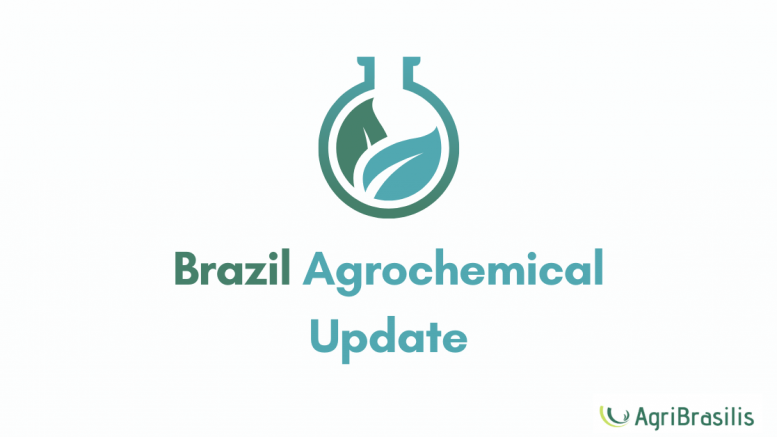Fertilizer Purchasing Power Index reached best level of last 5 months
President Lula da Silva said that “it makes no sense to import fuel, fertilizers, oil platforms…”. The executive director of the National Association for the Diffusion of Fertilizers, Ricardo Tortorella, warned about Brazil’s dependence on exports: “This excessive dependence is an unwanted vulnerability. We can and must manufacture more fertilizers in Brazil and seek a new balance between production and imports”. In addition, Tortorella foresees that the resurgence of the Ministry of Development, Industry and Foreign Trade could be positive for the sector. (ANDA; National Congress)
Biggest bioinput factory in Latin America should start operations by the end of 2023, in Itápolis, State of São Paulo. Their parent company is Crop Care, controlled by Grupo Pátria. Marcelo Pessanha, CEO of Crop Care, says that the bioinputs segment has grown by almost 50% per year and should maintain double-digit expansion over the next five years. “Eight out of ten farmers already use biofertilizers”, said Pessanha. (Crop Care)
AgroGalaxy issued agribusiness receivables certificates (CRAs) for sustainable financing. This issuance is the first one in the retail sector of agricultural inputs and aims to help farmers in their transition to sustainable, low-carbon and regenerative agriculture. Program begins its first phase with the issuance of approximately US$ 4.88 million in CRAs and directs resources to up to 25 soybean, wheat, corn, and coffee farmers. (AgroGalaxy)
Study performed by scientists from Brazil and Spain tracked the presence of 21 pesticides and four toxins produced by fungi of the genus Aspergillus (aflatoxins) in 50 samples of baby food sold in supermarkets in the State of São Paulo. As for pesticides, the presence of seven of the 21 compounds screened was revealed. “We found pesticide residues in 68% of the baby food samples analyzed. In the breakdown by composition and flavor, 47% of baby food with fruit had at least one pesticide residue. The amount was 85% for meat and plant-based baby foods,” said researcher and food engineer Rafaela Prata. (Fapesp; Unicamp)

Agricultural pesticides market continues to expand in Brazil. Formulated product sales reached 720.87 thousand tonnes of active ingredients, an increase of 5.03% compared to the previous year. In 2021, out of a total of 2,962 registered formulated products, only 1,379 (46.56%) were commercialized. Another 1,510 (50.98%) had zero production, imports, exports or sales. (Ibama)
Most sold pesticides in 2021 were glyphosate and its salts (219 thousand tonnes), 2,4-D (62 thousand tonnes), mancozeb (50 thousand tonnes), chlorothalonil (38 thousand tonnes) and atrazine (37 thousand tonnes). (Ibama)
Syngenta announces plans to acquire the production capacity of Ultrafine’s subsidiary in Indaiatuba, State of São Paulo. Acquisition is part of a project to expand the company’s unit in Paulínia, São Paulo. “Currently, the Paulínia facility supplies Brazil and other countries in Latin America. However, growth in recent years has surpassed our ability to absorb the expansion of the facility in the short term. Thus, Ultrafine proved to be the best alternative for this immediate expansion,” said Jorge Buzzetto, director of operations for Syngenta in Latin America. (Syngenta; Ultrafine)
Fertilizer Purchasing Power Index (IPCF) reached the best level of the last five months in December 2022, ending the year at 1.03 (compared to 1.1 in November). Exchange ratio and profitability were positive for farmers. This is because of the combination of a small reduction in fertilizer prices and the appreciation in the value of commodities. (Mosaic Fertilizantes)
Fertilizer imports from Russia by Brazil reached US$5.60 billion in 2022, an amount 58.8% higher than that registered in 2021, of US$3.53 billion. (Secretary of Foreign Trade)

Syngenta has carried out several expansion actions in the Brazilian market in recent years. Recently, the company purchased 100% of the share capital of Agro Jangada; signed a contract with Ouro Fino to sell thiamethoxam; and acquired the entire capital stock of Vipagro and Dipagro. The company is controlled by China National Chemical Corporation Limited. (Syngenta)
Ceradis BV is in the process of negotiating to contract the distribution and sale of the fungicide Ceramax, a biological fungicide based on natamycin, registered for seed treatment of soybeans against Fusarium solani. (Ceradis BV)
Ministry in charge of National Fertilizer Plan (PNF) is yet to be determined after the extinction of the Secretariat for Strategic Affairs of the Presidency of the Republic. “Our understanding is that the PNF should be coordinated by the Ministry of Development, Industry, Commerce and Services, since it will be responsible for implementing public policies that make investments for the development and modernization of the national industry, in general, and for the reindustrialization of strategic segments, such as fertilizers in particular”, said Clorialdo Levrero, president of the deliberative council of the Brazilian Association of Industries in Technology in Plant Nutrition. (Abisolo)
In compliance with court decision, Anvisa approves the toxicological evaluation of a mixture of pesticides based on azoxystrobin + fipronil + thiophanate-methyl, from Albaugh. (Anvisa)
State University of Londrina patented a fungicide based on Bacillus velezensis, for soybean, black beans, pinto beans and corn. The concession by the National Institute of Industrial

MORE ABOUT PESTICIDES:

